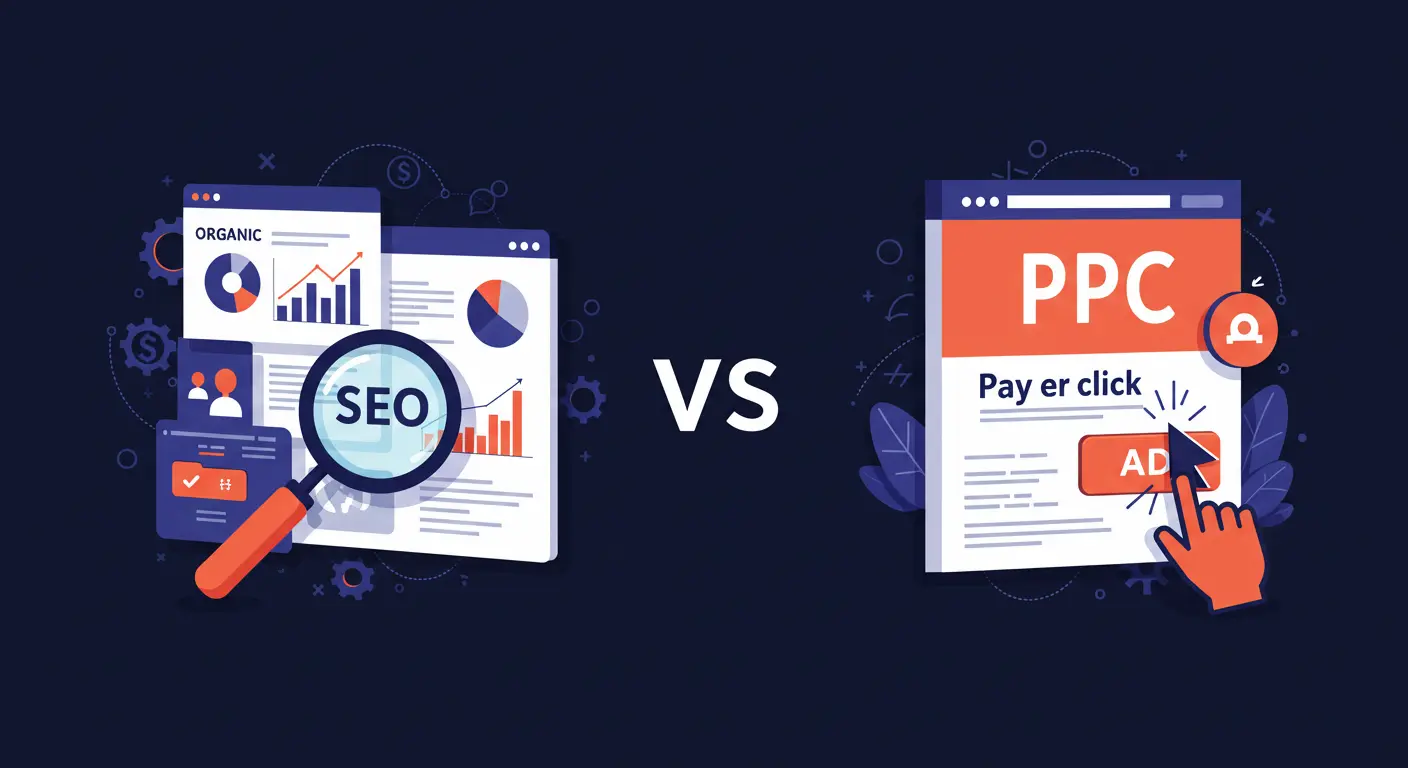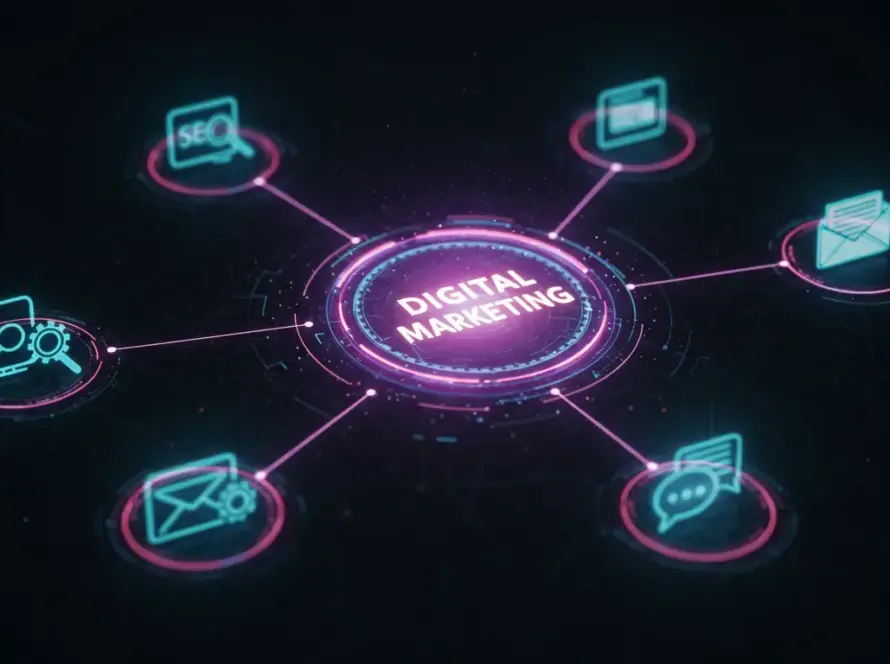You have a website, some products to sell, and a budget that feels a little too small. Sound familiar?
Now comes the big question: Should you invest in SEO or go all-in on PPC ads? One promises long-term traffic without paying for every click. The other delivers fast results, but only if your wallet can keep up.
So, which one actually works better?
Let’s cut through the noise and settle this with real examples and honest answers.
What Are We Even Talking About Here?
Before jumping into comparisons, let’s get clear on what SEO and PPC really are.
What is SEO?
Think of SEO like planting a garden. You prepare the soil, plant the seeds, water them, and wait. It takes time, but once it grows, you get fresh traffic without having to pay for every visitor.
At its core, SEO (Search Engine Optimization) is about helping your site show up when people search for things on Google. There are three main parts:
- On-page SEO is everything you do on your site. Your page titles, the words you write, your images, and even how fast your page loads.
- Off-page SEO is about your reputation. It includes things like backlinks (when other sites link to yours), online mentions, and reviews.
- Technical SEO is the behind-the-scenes stuff. It’s about making sure your site is easy for search engines to crawl and index.
Now SEO brings in free traffic but that doesn’t mean it’s easy or free to get. It takes time, effort, and usually some budget too, especially if you’re hiring someone or using tools.
But once your pages rank, they can keep bringing in visitors for months or even years without you spending more.
PPC Demystified
Now let’s talk about PPC ( Pay-Per-Click). Imagine a vending machine where you put money in, press a button, and out comes traffic. The moment you stop feeding it coins, the traffic stops.
With PPC, you’re paying to show up at the top of search results or in people’s social feeds. You only get charged when someone clicks your ad, hence the name.
There are a few main types of PPC:
- Search ads appear on Google when someone types in a keyword.
- Display ads are the image banners you see on websites.
- Social media ads run on platforms like Facebook, Instagram, LinkedIn, and TikTok.
- Shopping ads show up when someone’s looking to buy something specific (like “running shoes” or “wireless headphones”).
The best part? PPC gets you traffic fast. You could launch a campaign today and start getting clicks within hours.
The catch? It only works as long as you’re paying. Once the ad budget runs out, so does the traffic.
The Head-to-Head Comparison
How Fast Do You See Results?
This one’s simple.
SEO is slow. You could do everything right. Optimize your pages, build good content, earn backlinks and still not see results for three to six months. Sometimes longer. But once it starts working, it keeps going in the background.
PPC is fast. You can launch a campaign today and get clicks in a matter of minutes. It’s like flipping a switch.
The part where most businesses get stuck is they want fast results, so they go for PPC. But what they often need is the long-term value that SEO brings. Ideally, both work together. One gives you quick wins, the other builds your foundation.
What Does It Actually Cost?
SEO doesn’t charge you per click. But that doesn’t mean it’s free. You’re paying with your time, your effort, and likely your money whether it’s writing content, buying tools, or hiring someone to help.
PPC charges you every time someone clicks. And the more competitive your keywords, the more expensive those clicks can get. For some industries, a single click can cost $10, $20, or more.
Let’s say you have a $1,000 monthly budget.
- With SEO, that might cover a few well-written blog posts and a basic tool subscription. Results take longer, but once your content ranks, it can drive traffic for months with no extra cost.
- With PPC, $1,000 might get you 200–500 clicks depending on your niche. If your site isn’t ready to convert those clicks, you’ve spent the budget with little to show for it.
Here’s a quick stat to keep in mind: SEO converts at 2.4% while PPC sits around 1.3%. So even though SEO takes more time upfront, the long-term return can be better.
Who Do People Actually Trust?
Most users scroll right past ads. That’s not an opinion, it’s a pattern. People have developed what’s called “ad blindness.” They skip over anything that looks sponsored, especially if it feels pushy or irrelevant.
That’s why 70% of marketers say SEO is more effective than PPC when it comes to building trust.
Organic results look more natural. They feel earned, not bought. And with ad blockers on the rise, there’s a good chance your PPC ads won’t even be seen by some users.
If trust matters in your industry (and it almost always does), SEO helps build it slowly and steadily.
What About Conversions?
Now we’re talking real business impact.
- Organic search traffic converts at 14.6%, according to recent studies.
- PPC traffic converts at about 10%.
That might not sound like a huge difference until you scale it. Across hundreds or thousands of visitors, SEO brings in more buyers.
And it gets even more interesting in certain industries. In Financial Services, for example, SEO converts at 7.3 times the rate of PPC. That’s a serious gap.
The reason? Organic traffic usually comes from people who are actively searching and researching. They trust what they find and are more likely to stick around.
How Much Control Do You Really Have?
With PPC, you’re in the driver’s seat. You decide what keywords to target, who sees your ad, how much you want to spend, and what the message says. You can test and tweak everything.
But once your money runs out, so does the traffic.
With SEO, you don’t get that same level of control. You’re playing by Google’s rules and those rules can change overnight. One algorithm update can shift your rankings in a day.
So while PPC gives you more hands-on control, it’s also more dependent on budget. SEO feels slower and less predictable, but it builds assets that work in the background over time.
When to Choose SEO
If you’re playing the long game, SEO is your best friend. It’s not the fastest route to results, but it’s one of the most powerful ways to build trust, authority, and consistent traffic over time.
SEO works best when you’re building something that’s meant to last. Whether it’s a blog, an e-commerce store, or a service-based business, investing in SEO means you’re planting seeds that will grow month after month, sometimes even years after your original content was published.
It’s also a smart choice when your budget is tight. You might not see results right away, but if you can be patient, the return often outweighs what you’d spend on paid clicks. Remember: organic search drives 53% of all website traffic, and once your site starts ranking, every click is free.
SEO is especially important in industries where pay-per-click ads cost a fortune. For example, legal and finance-related keywords can run up to $50–$100 per click. In those cases, working on your rankings might save you a ton in the long run.
Lastly, SEO helps build industry authority. Showing up in search results for the right keywords makes your business look reliable and credible. People trust what they find on Google, often more than what shows up in ads.
When PPC Makes Perfect Sense
Sometimes, you don’t have time to wait. That’s where PPC comes in.
If you’re launching a new product, running a holiday campaign, or promoting a limited-time event, PPC can give you instant visibility. You could start seeing clicks and traffic the same day your ad goes live.
PPC is also a good fit if you’ve got a flexible budget and want clear, trackable results. Every click, every conversion, and every dollar spent can be measured. You’ll know exactly what’s working and what’s not.
It’s also great for testing new products or markets. Want to see if people in a new city or niche are interested in your offer? Run a short campaign and see how they respond. No need to guess.
For local businesses, PPC can be especially effective. With location targeting, you can make sure your ads are shown only to people in your city or neighborhood. That’s powerful if you run a café, dental clinic, real estate agency, or anything tied to one area.
Even though PPC has a lower average conversion rate than SEO, 10% vs. 14.6% for organic search it still delivers strong results, especially when your messaging is on point and your site is ready to convert.
The Plot Twist: Why Not Both?
You don’t have to choose just one. In fact, some of the most successful businesses use SEO and PPC together. Not as competitors, but as a team.
Because 27% of website traffic still comes from paid search, while organic search drives 53%. That’s more than 80% of traffic combined. If you’re only using one channel, you’re leaving a lot on the table.
SEO and PPC each have their strengths, but when used together, they help fill in each other’s gaps.
For example, you can run a quick PPC campaign to test which keywords actually bring in the right kind of traffic. Once you know what works, you can build content around those terms and let your SEO efforts grow organically.
You can also use PPC to protect your brand name in search results especially if competitors are bidding on it. That way, you stay visible while your SEO rankings catch up.
Think of it like this:
- PPC gives you speed. It’s great for launching, testing, or boosting traffic quickly.
- SEO gives you staying power. Once your content ranks, it keeps working for you day and night.
Together, they’re a solid 1–2 punch. One drives instant clicks, the other builds long-term trust.
The Future of Both (2025 and Beyond)
The digital world isn’t sitting still. Both SEO and PPC are changing fast and what worked last year might not cut it today.
What’s Changed Recently
- AI search is evolving. Google is rolling out AI-powered overviews, which means users get answers right in the results without clicking through. That changes how both paid and organic listings are seen.
- Mobile-first indexing is now the standard. If your site doesn’t work well on phones, you’re in trouble no matter what strategy you use.
- Voice search is growing. More people are asking their phones for help, which means both PPC and SEO need to adapt to natural, question-based keywords.
- Privacy rules are tightening. With third-party cookies going away, PPC targeting is getting trickier. Marketers now need better first-party data and cleaner messaging to reach the right people.
What to Keep an Eye On
- PPC campaigns are still strong. On average, businesses are seeing a 200% ROI from Google Ads. That’s $2 earned for every $1 spent (when done right).
- Visual search is gaining ground. Platforms like Pinterest and even Google Lens are helping people search using images, not words. That affects everything from SEO image optimization to ad creatives.
- AI is changing the game. From automated bidding in PPC to smart content generation in SEO, AI is making both strategies faster and more data-driven. But tools are just tools. You still need a clear message and a real connection with your audience.
Conclusion
The choice between SEO and PPC comes down to your goals, your timeline, and your budget.
If you’re focused on building something lasting and have the patience to let it grow, SEO is a great path. It helps you build trust, authority, and steady traffic over time. But it takes commitment and consistency.
If you’re launching something new, need quick traffic, or want to test a campaign fast, PPC can give you results right away. It works well when you know your numbers and are ready to invest.
For many businesses, the best results come from using both. PPC can bring in early traffic and help you learn what works. SEO can build on that and keep people coming long after the ads stop.
If you’re still unsure where to begin, or if you’re looking for someone who can help you figure out the right approach for your business, PLYXIO is always here. We work with real people, real goals, and real timelines. And we’re happy to help you move forward with clarity and confidence.



